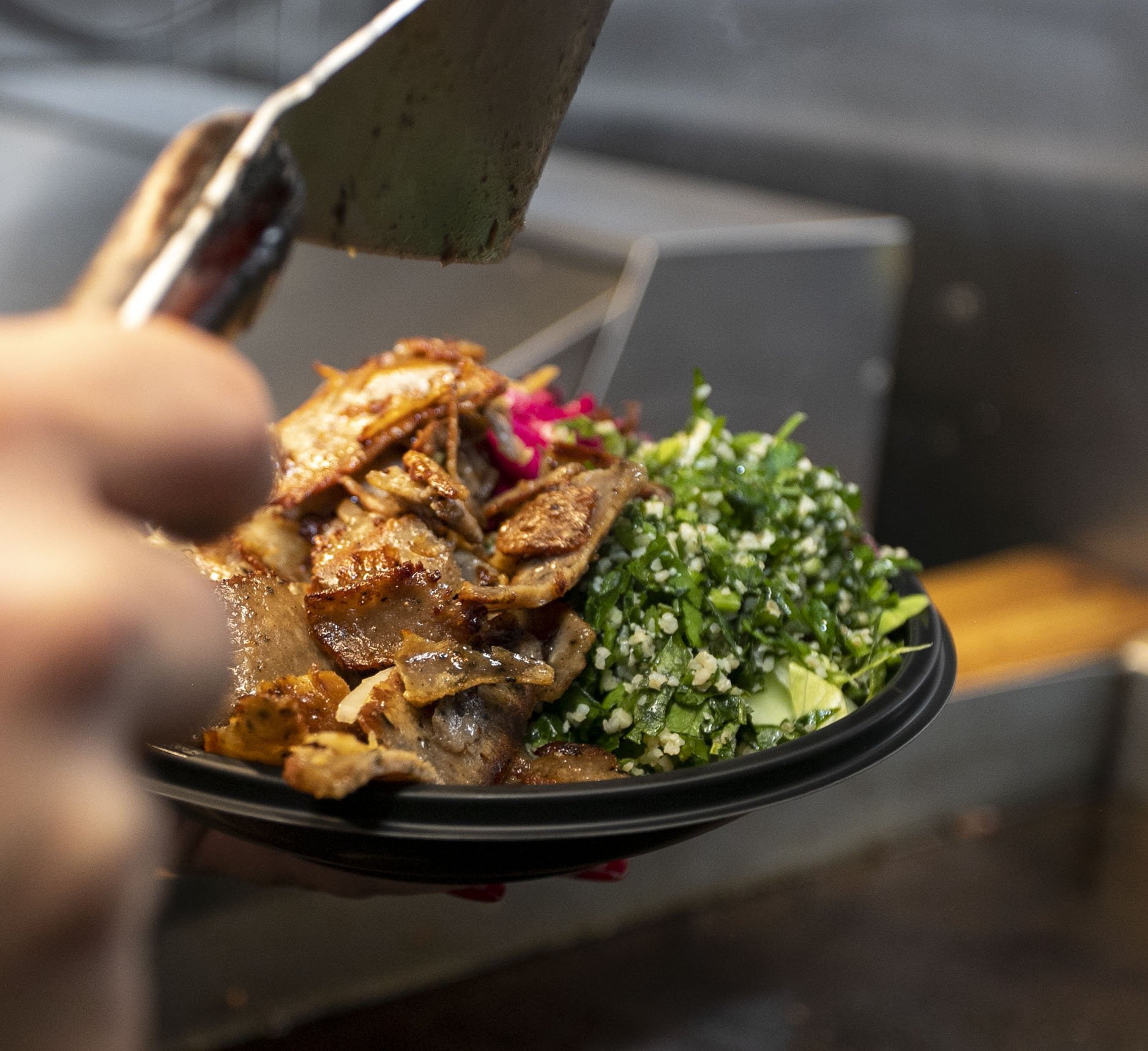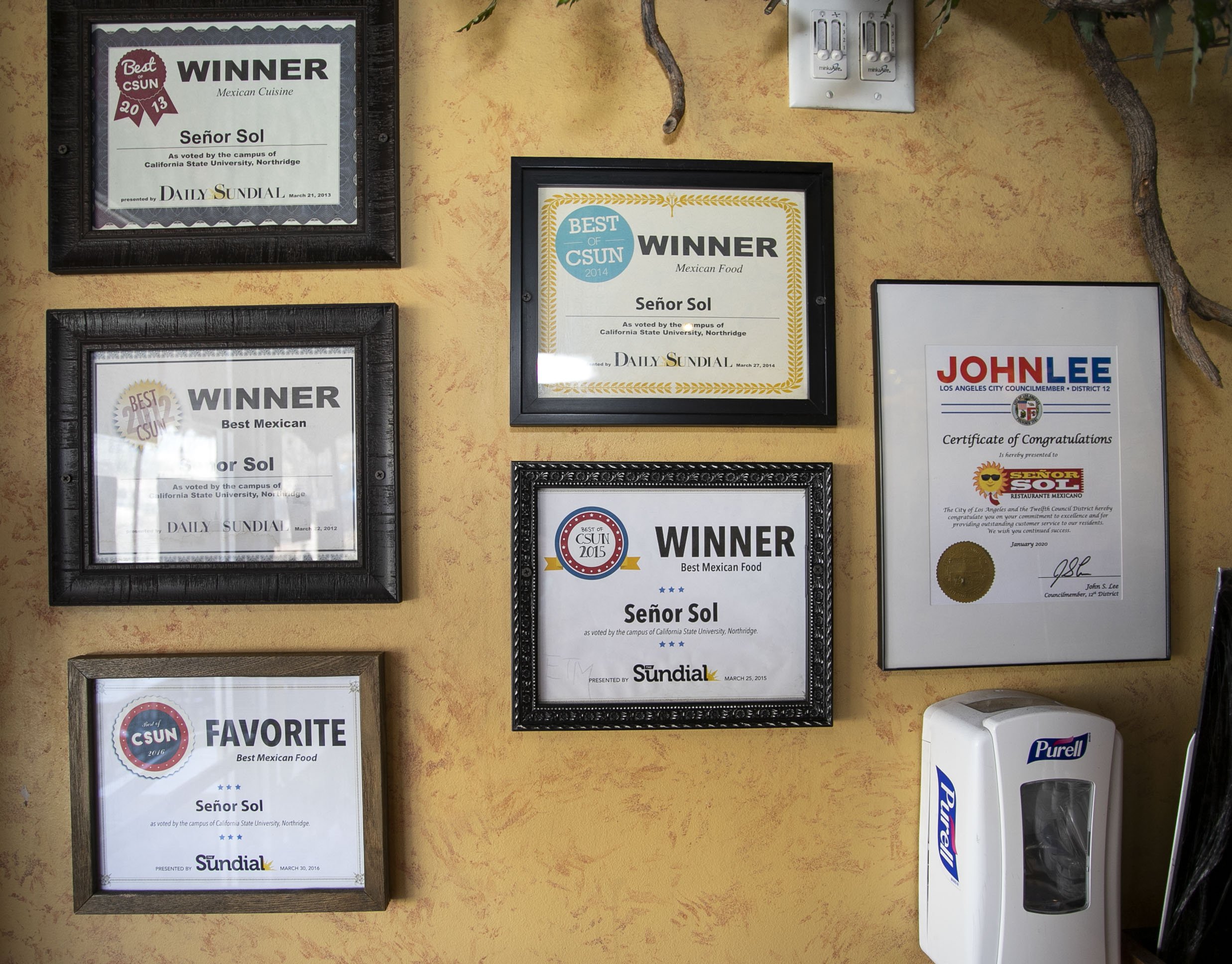Still Standing
Photos by Habeba Mostafa
Feeding the CSUN community
Gina (right), the owner of Falafel Palace, with her daytime employees. (Habeba Mostafa | Scene Magazine)
COVID-19 struck hard and fast, as we are more than two years removed from the pandemic’s start, and many people are still feeling the effects of the worldwide shutdown. Some of the biggest recipients of the covid effect have been restaurant businesses, as around this time last year nearly a third of California's restaurants permanently closed.
CSUN students were pleased upon returning to campus to see that two of their favorite food stops, Seňor Sol and Falafel Palace, were still standing.
Falafel Palace is a family-owned and operated restaurant that opened in 1972 by Sam Danon — 2022 marking 50 years of its existence.
Today, it is run by his twin daughters, Gina and Rebecca Danon. Both Gina and Rebecca pride themselves on making Falafel Palace a staple in the community.
Falafel Palace has catered over hundreds of CSUN events, most recently as this year. Their relationship with the university dates back to the 1994 Northridge earthquake, where they fed a lot of the faculty and staff by having their food truck stationed on campus. The tragic event saw the campus cafeteria crumble, and become inoperable.
Falafel Palace has always seen CSUN students and staff as an integral part of its business, making up about 15% of its yearly revenue.
When the pandemic first hit, there was a discussion amongst the sisters about whether or not to shut down. Gina wanted to keep it open, but Rebecca wanted to close.
Ultimately the sisters made the decision not to shut down because they and their employees had to pay their bills. It was a rough 2 to 3 months at the start of the pandemic’s start. Gina believes their rough start could be attributed to too many people being afraid to go out, or even drive.
Falafel Palace did make the decision to close the inside part of the restaurant at the beginning of the pandemic and had to use third-party delivery services in order to survive and compensate for the loss of revenue.
“If we didn’t use the third parties we would be at a major loss,” said Gina.
The pandemic immediately caused a fast loss in revenue which was something they had never seen before. On top of dealing with a global pandemic, Gina and her sister saw a significant increase in cost for simple things like forks, plastics, condiments, and oils. The cost of a plastic bowl used for to-go orders went from $.15 to upwards of $.75, and even a dollar at times.
“One day we were out of napkins and it took forever to get a new shipment, we were forced to go to the grocery store and buy some,” said Gina
As the demand for takeout began to increase, not being able to have some of your little essentials for a to-go order made things difficult. The minimum wage increase also led to a stricter budget.
Falafel Palace did apply for the PPP loan, however, they only asked for just a small amount of $28,000 to give them some breathing room.
When Gina became aware that students were returning to campus, her spirits in hopes of surviving very much increased, as she was able to see people come in and bring life to the place. To her, students are much needed at the restaurant as they bring fun energy to the restaurant.
Today Falafel Palace has seen its business return to normal, sooner than other restaurants. They still do catering, and third-party delivery services, which has helped them get back to 100% financial stability.
What makes Falafel Palace special is they import a lot of their produce from Turkey and Greece, they make their food from scratch fresh every day and they make it their mission to have customers feel like family.
Falafel Palace would like to tell any CSUN students, faculty, or any possible new customers that they have fresh quality and healthy food. Twin sisters Gina and Rebecca are here for their customers for 50 years, and are here for whatever you need.
Seňor Sol is a part of the Las Fuentes family, founded by Alejandro Morales and Norma Morales, who established Las Fuentes in 1982 after starting out with a food truck off Vanowen St. and Reseda Blvd. After immediate success, the Morales family decided to open up a second restaurant called Melodys in 1993, and later Sol y Luna in 2004.
Seňor Sol is operated by Veronica Parra and her husband, who spoke to the Morales’s about opening up another restaurant. Veronica advocates for a cozy environment, giving customers a little taste of Mexico.
In 2011 Seňor Sol opened up and was an instant success with the campus attributing to about 10-15% of the business income coming from students and staff. Fast forward to 2020 and the restaurant was forced to shut down and lay off all its employees due to the pandemic
“Not having students on campus did affect us as we saw a lot less foot traffic,” said Parra.
Veronica however kept in contact with all Seňor Sol employees and after eight weeks, asked if they were ready and willing to come back to work. All the employees except for about 1-2 workers returned to work in May of 2020.
The initial shutdown quickly affected Seňor Sol as it saw a nosedive in its business. To supplement some of the revenue loss, Veronica opened up the restaurant to third-party delivery services, something they had never done before. Despite this, business was still slow, and she saw little growth from the third parties.
Seňor Sol, much like many other restaurants, made the necessary adjustments to stay open such as adding shields, sanitizers, and requiring face masks.
“Without the government PPP loan we would have been forced to close permanently,” said Veronica.
Government grants and the Paycheck Protection Program loan helped pay for the payroll for the employees and allowed this restaurant to survive.
With money tight, Seňor Sol was forced to change its hours from 8 A.M. to 10 P.M., to 11 A.M. to 9 P.M., eliminating their breakfast hours. If COVID-19 wasn’t enough, the Minimum Wage went up. Veronica was happy for the employees to receive a bump in pay, however, it made staying afloat that much more difficult.
When Veronica was aware that CSUN students were returning to campus, the news improved her spirits and hopes of surviving. She saw more activity in her place, on the streets, and just around her restaurant.
As of today, Seňor Sol still is not 100% back to normal on a financial level, however, they are around 90% back to normal as compared to 2019’s revenue. With the employees working less hours because of the change in store hours, they are still not at their normal paycheck numbers pre-pandemic, especially with the increase in prices for many of the foods and supplies they need.
Veronica‘s message to any CSUN student who hasn’t tried this place is that if you’re looking for homemade food that makes you feel like you’re in your mom‘s kitchen, go to Seňor Sol.















